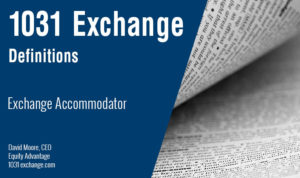Gotta Minute – Learn A Lot!
In today’s financial landscape, many investors find themselves in difficult situations, particularly when facing foreclosure on their investment properties. David Moore, CEO of Equity Advantage, sheds light on one such scenario involving an Exchangor who holds a Tenants in Common (TIC) that is on the brink of foreclosure. This situation presents unique tax implications and potential strategies to mitigate losses.
The Dilemma of Phantom Gains
When an Exchangor faces foreclosure, they can experience what is known as “Phantom Gains.” This occurs when the debt on the property exceeds its basis, which can lead to significant tax consequences. In essence, the debt is treated as a sales price, and the Exchangor may find themselves liable for taxes on the difference, potentially facing up to 40% in taxes after losing their property and all their equity.
Options Available to the Exchangor
The Exchangor essentially has two options:
- Lose everything and pay almost 40% in tax.
- Engage in a 1031 Exchange, which would require a 20% down payment.
The 1031 Exchange Solution
David points out that a 1031 Exchange can be set up in a way that benefits the Exchangor when facing foreclosure circumstances. The crucial step involves transferring the property facing foreclosure to Equity Advantage before the foreclosure process begins – this action effectively shields the Exchangor from receiving any debt relief. By taking this measure and isolating themselves from receiving debt relief through Equity Advantage before the foreclosure occurs helps in steering clear of Phantom Gains and their associated implications.p>
Timeline for Replacement Property Acquisition
Once the property is transferred, the Exchangor has a window of 180 days to secure a property as a replacement. This timeframe is crucial, for enabling the Exchangor to search for properties while managing the intricacies of their financial circumstances.
Utilizing a Zero Coupon DST
In many cases, the Exchangor opts to invest the funds that were earmarked for taxes into an 80% Loan To Value (LTV) “Zero Coupon” Delaware Statutory Trust ( DST) serving as a payment.This approach not aids in deferring taxes. Also opens up opportunities, for potential equity growth, in the future.Although the DST might not yield cash returns it has the potential to build equity over a period of five to seven years.
Making the Choice
In the end, the Exchangor must decide whether to pay a tax after losing everything or strategically opt to invest in a DST to safeguard some capital and possibly acquire equity, in the future.’ David stresses the significance of being informed in scenarios as numerous investors may not grasp their choices until its already too late.
In conclusion, for Exchangors facing the challenging prospect of foreclosure, understanding the implications of Phantom Gains and the benefits of a 1031 Exchange can be pivotal in making informed decisions about their financial future. With the right guidance and strategy, it’s possible to navigate these turbulent waters effectively.
To stay up to date with our video content subscribe to our YouTube channel.
Whether looking for information on simple to complex 1031 issues, Cost Segregation, Life Insurance Contract Sales, DSTs or even Qualified Opportunity Zones you will find information on our channel.
The Guys With All The Answers…
 David and Thomas Moore, the co-founders of Equity Advantage & IRA Advantage
David and Thomas Moore, the co-founders of Equity Advantage & IRA Advantage
Whether working through a 1031 Exchange with Equity Advantage, acquiring real estate with an IRA through IRA Advantage or listing investment property through our Post 1031 property listing site, we are here to help Investors get where they want to be. Call them today! 503-635-1031.









